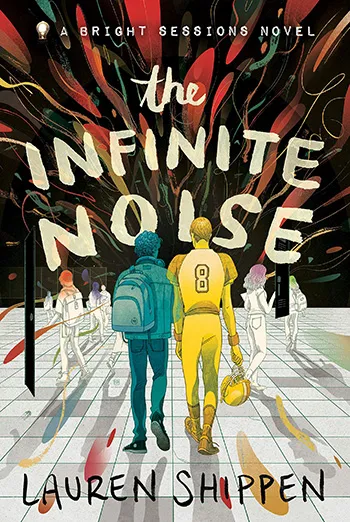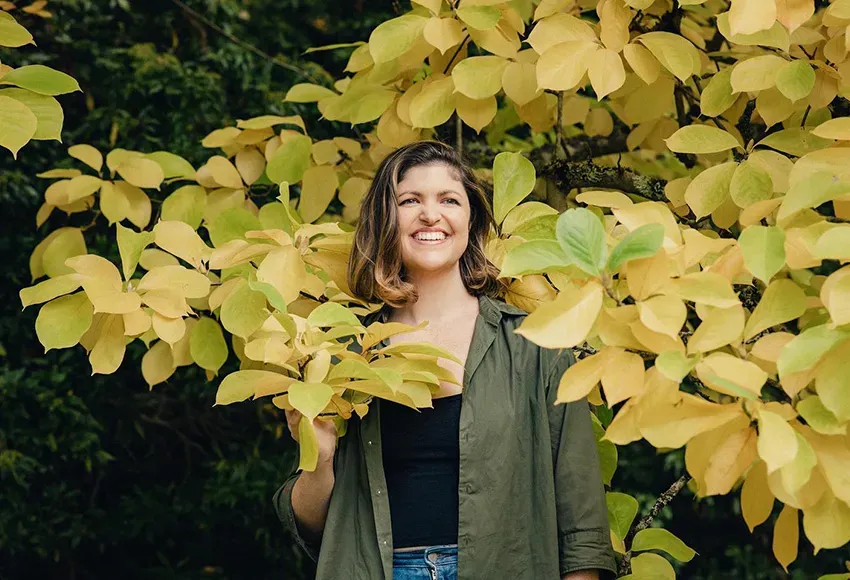Over the last decade, the rise of podcasts has led to a revolution in storytelling. Fans can now consume intricate, thought-provoking, fantastical stories without reading anything more than a title. The podcast revolution first put author Lauren Shippen on the map.
"I am an audio-forward writer. Audio is where I got started. It's where I do most of my work," Shippen said.
In 2015 she released the first season of her critically acclaimed science fiction podcast, The Bright Sessions. The first season features Caleb Michaels, a teenage boy with the supernatural power to connect with others' feelings. His empathy leads him to develop affection for a classmate, and the romance provides the arc of his journey.
The series became a hit and led Shippen to produce, write, and direct several other podcasts, but there was always something in her original story she wanted to explore further.
"The format of The Bright Sessions podcast is only therapy sessions, so we're only hearing things from Caleb's perspective as he's relaying them to his therapist," Shippen said. But she wanted to explore the romance from other perspectives, like that of Caleb's love interest, Adam.
"I started to write for my edification, and as an exercise," she said. "I wrote some scenes from Adam's perspective, as a YA format, and it just sat at my computer for a little bit and collected dust."
Eventually, Shippen found a literary agent who was curious about a Bright Sessions–inspired novel. "I was, like, 'Actually, I might have something. I don't know if YA is what you were thinking, but I have this.' I ended up coming up with two other books that follow different characters in the podcast," Shippen said.
The second book in the series serves as a prequel to the podcast and explores the background of the main antagonist, and the third novel extends beyond the final episode.

The final installment of the Bright Sessions trilogy is out now. Each book builds off the Bright Sessions universe but can also stand on its own and does not need to be read in order. "If you want to start with a light romance, start with The Infinite Noise, the first book in the trilogy. If you want to start with something angsty, start with the second book," Shippen said.
Telling the story in a new way
"The advantage that books gave me in telling the story – and why I wanted to [extend] my storytelling in this universe, with books – is because I can get a lot more granular [with] characters and their inner thoughts and feelings and really zero in [on] ...on one character's journey or perspective," she said. "In the podcast, it's a little more interwoven stories of a bunch of different cast and characters."
As for the books, she said, "It started because I wanted to tell the love story of Caleb and Adam. After all, all of their moments, their first date, their first kiss, [are] not happening in a therapy room. We missed all that as the audience, and I missed writing that as a writer."
Not only did writing the novel help Shippen explore her characters in new ways, but it also allowed her to amend some early mistakes.
"For book structure – and just the fact that by the time I started writing the book, I had become a better writer, who understood my story better – I made some little changes here and there. It's not an exact one-to-one translation," she said.
Hitting close to home
Shippen found inspiration to create this therapy environment from her own experiences dealing with her mental health and queerness, which in turn helped Shippen find the courage to seek out a therapist and explore her sexuality in more depth.
"The thing that got me into therapy was writing The Bright Sessions, which was interesting to admit, because I had made my characters do it before I did it," she said with a laugh.
"I wrote it when I knew I was Bisexual, and I had come out to people in my life, [but] not everybody in my life. I hadn't started ...dating, and I was making the transition from 'I'm an ally, and that's why I care about these issues so much,' to 'I'm an ally, and it hits much closer to home than I had initially thought.'"
The character Sam, whom Shippen voiced in the original podcast, served as a stand-in for herself. Through Sam, she processed her history of panic attacks and her bisexuality. Adding a supernatural element also gave Shippen room to play with metaphors when exploring different sides of mental health.
"I prefer to write what I think of as speculative fiction," Shippen said. "The Bright Sessions books are light-touch sci-fi. People have these special abilities, but it's not hard sci-fi. It's not even a superpower story; it's just an element of these people's existence."
Giving her character abilities, like time travel, super empathy, or mind-reading, opened the door for Shippen to ponder how real people might interact in unreal situations. "I like using the extraordinary, supernatural, and paranormal to explore mundane problems," she said. "How do you get along with your sibling who can read your mind? Is that a metaphor for mental health, queerness, or relationship problems? It's so fun for me, as a writer, to explore all the problems we have in our real lives through the lens that is unreal."
Rich with metaphors
In Caleb's story, hyperempathy worked as a stand-in for queerness. "I started to think about other metaphors. [I wanted to play with tropes and clichés.] That's where Caleb came in... Caleb is the classic high school jock. [I gave] him the power of empathy [to see] what that would do [to] somebody struggling with toxic masculinity and their sexuality."
While Caleb's romance in the novel is with another boy, the supernatural metaphor adds another, deeper layer of queerness for readers to uncover.
"Caleb never defines his sexuality, but I think of him as a Demisexual, somebody who is attracted based on emotional attachment," Shippen said. "I think that, again, for him, there's real isolation in the fact that he can feel other people's feelings, which is a bit of an oxymoron, because he is so connected with other people [and] he's feeling their feelings all the time."
Isolation is a theme Shippen explored throughout the podcast and the three follow-up novels. "It's a sense of loneliness that comes with struggling with your mental health or your sexuality," she said as she recalled her own battles with both. Even though Shippen grew up in an accepting family, she still worried about coming out.
"It's still a bit of an adjustment to discover a part of yourself and then realize, 'Oh, this thing I thought I knew about myself is not true. Now this other thing has opened up, and how do I explain that to people in my life, even though I know they're accepting?'" she explained. "Also experiencing some biphobia within the larger Queer community, which unfortunately happens.
"Using superpowers creates different types of isolation for characters, and as the story goes on, they start to meet each other. Their shared atypical abilities connect them as a found family, which a lot of Queer people experience."
It always had to be Queer
The Bright Sessions was always rooted in queerness. Shippen knew Caleb would have a romance with another boy, eventually figured out Sam would be Bisexual, and always intended for Chloe to be Asexual.
She believes writing Queer characters provides more fodder for plots. "I tend to lean on characters being Pansexual, Bisexual, or Demisexual, because if their options are potentially anybody, then that's fun for me."
Some critics have accused her of trying to create liberal propaganda, but her intention has always been to write about spaces where people can feel seen and understood.
"I've gotten the message [like], '...You're pushing your liberal Gay agenda into this story!' It's like, well, then, don't listen to it, don't read it," she said. "I don't have some agenda or message. Simply, the thing I wanted to achieve in these works is the feeling that I'm not alone. This feeling that I'm reaching out a hand to people, because I'm lonely and I'm writing these stories about isolation, and I hope a hand reaches back."
The takeaway she hopes readers and listeners feel when they engage with The Bright Sessions is that a community is out there and ready to welcome them. "I hope people walk away with the feeling that they're not alone and even if they haven't found their community yet and they haven't found a sense of belonging yet, there is a space for them. The world wants them to exist."
Next up
Now that she's completed the Bright Sessions trilogy, Shippen is ready to work on something new. "I spent the last many years working as a professional podcast writer and producer, which is incredible, but I also feel like after going and going on for many years, I've lost sight of my process, so I want to get back into making my own thing again," she said.
"Sometime this summer I'm going to be very low-key releasing a podcast that is all me." She is excited to release the all-new DIY podcast sometime this July or August.
Until then, Shippen is also working on her next novel. "I've been working forever on a Queer cowboy romance, an enemies-to-lovers romance," she said. "Initially, it started as a podcast. Then I thought it really would be better as a novel."
The cowboy novel does not have a release date yet, but she's been working on it since 2018. "It has tragedy in it, it is rivals-to-enemies to best friends-to-lovers, and it has a happy ending," she said.
"I'm a huge fan of Westerns," she added. "One thing that irritates me about classic Westerns is the fact that the Wild West was an incredibly Queer place, both in sexuality and gender. It was populated by people of color – it wasn't this straight, white-man fantasy. The real Wild West had tons of Trans people, people of color, and different types of relationships. I want to tell stories that reflect that history, because I think that's much more interesting than what classic Westerns show."
Fans can listen to The Bright Sessions on Spotify, Apple Music, or iTunes. The books are called The Infinite Noise, A Neon Darkness, and Some Faraway Place.


